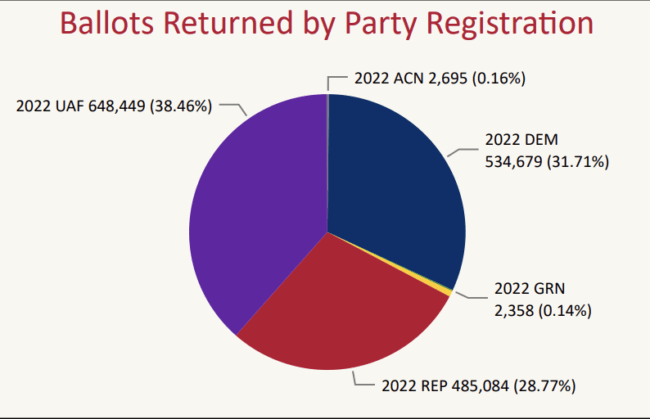
U.S. Senate
See Full Big Line
(D) J. Hickenlooper*
(R) Somebody
80%
20%

Governor
See Full Big Line
(D) Joe Neguse
(D) Phil Weiser
(D) Jena Griswold
60%
60%
40%↓

Att. General
See Full Big Line
(D) M. Dougherty
(D) Alexis King
(D) Brian Mason
40%
40%
30%

Sec. of State
See Full Big Line
(D) George Stern
(D) A. Gonzalez
(R) Sheri Davis
40%
40%
30%

State Treasurer
See Full Big Line
(D) Brianna Titone
(R) Kevin Grantham
(D) Jerry DiTullio
60%
30%
20%

CO-01 (Denver)
See Full Big Line
(D) Diana DeGette*
(R) Somebody
90%
2%

CO-02 (Boulder-ish)
See Full Big Line
(D) Joe Neguse*
(R) Somebody
90%
2%

CO-03 (West & Southern CO)
See Full Big Line
(R) Jeff Hurd*
(D) Somebody
80%
40%

CO-04 (Northeast-ish Colorado)
See Full Big Line
(R) Lauren Boebert*
(D) Somebody
90%
10%

CO-05 (Colorado Springs)
See Full Big Line
(R) Jeff Crank*
(D) Somebody
80%
20%

CO-06 (Aurora)
See Full Big Line
(D) Jason Crow*
(R) Somebody
90%
10%

CO-07 (Jefferson County)
See Full Big Line
(D) B. Pettersen*
(R) Somebody
90%
10%

CO-08 (Northern Colo.)
See Full Big Line
(R) Gabe Evans*
(D) Yadira Caraveo
(D) Joe Salazar
50%
40%
40%

State Senate Majority
See Full Big Line
DEMOCRATS
REPUBLICANS
80%
20%

State House Majority
See Full Big Line
DEMOCRATS
REPUBLICANS
95%
5%
 November 08, 2022 10:39 AM UTC
November 08, 2022 10:39 AM UTC 6 Comments
6 Comments
The 0.16% represents how Neuschwanger is stealing the election from Hiedi, just to clear things up.
Do Unaffiliateds typically split 50/50?
If so, then Dems are ahead 52.4 compared to Republicans at 47.6.
Does anyone have historic comparison of ballots returned to election results that might show how Unaffs split? I’m not sure we get election day results showing Unaffs, but by that point everyone is looking at results, and not wondering such details.
Since these are actually returned ballots we have eliminated the 10% of un-commited.
From 2008, 2012, 2016, 2018, in Colorado as a whole, U’s lean Dem by about 5 points. In red districts like CD4 or CD3, Us lean R by about 20 points, That’s what I recall, but can’t look up the source at the moment.
Vox found U and I voters turning in 80% Dem ballots in the 2018 primary. https://www.vox.com/mischiefs-of-faction/2018/6/29/17509868/how-colorados-unaffiliated-voted
So that would be a huge D advantage if that carries over into a midterm election.
However, more U’s turned red than turned blue in 2022, per Fox. https://kdvr.com/news/like-u-s-colorado-has-gotten-more-republican-in-the-last-year/
2018 election was followed almost immediately by a Magellan Strategies survey of 500 Unaffiliated voters. Unaffiliated split 59-25 in the Governor's race, with the rest split between minor parties and undervotes.
David Flaherty summarized it this way:
In the survey findings,
Replacing the useless pie chart above with a useful chart.
Brought to you by the brilliant insight at Liberal & Loving It
So if someone high up in a campaign sees the the focus/messaging/spend is ineffective, will they speak out? Or will that be a career limiting move?
From talking to a number of people I get the impression that a lot of what is said & done is because that's what has been said & done for the last 20 years.
While business marketing is different from political marketing, I think it does hold in common that whatever worked even 5 years ago is unlikely to presently be the most effective now.